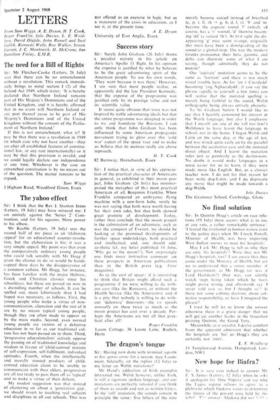The dragon's tongue
Sir: Having now done with terminal reports et hoc genus omne for a season. may I com- ment, belatedly, on the replies (12 July) to my letter on Welsh mutations?
Mr Hand's adduction of Irish examples interested me. Welsh however, unlike Irish, is still a vigorous spoken language; and our mutations are perfectly rational if you think of them as sounds and not as written letters. In the 'soft' mutation, the sounds remain in principle the same: five letters of the nine merely become voiced instead of breathed
(c, p, t. II, rh b, d, 1, r); 'b' and 'rt. become the cognate sound 'f' (which, of course, has a 'v' sound), 'd' likewise becom- ing 'dd. (a voiced 'th'). At first sight the dis- appearing 'g' may seem strange; originally this must have been a downgrading of the sound to a glottal stop. The way the modern Greeks pronounce their beta, gamma, and delta can illustrate some of what I am saying, though admittedly they do not mutate!
Our 'aspirate' mutation seems to be the same as 'lenition' and there is not much visual trouble here. As for 'yn + Caerdydd' becoming 'yng Nghaerdydd% if you say the phrase rapidly to yourself a few times you will realise that the mutated spelling is merely being faithful to the sound, Welsh orthography being always entirely phonetic.
To Sir Graham Sutton I would like to say that I heartily commend his interest in the Welsh language; but also I emphasise that I myself am one of the (all too few!) Welshmen to have learnt the language in school, not in the home. I began Welsh and Latin on the same day, at the age of ten, and was struck quite early on by the parallel between the accusative case and the mutated direct object. And I learnt the mutation rules just as painlessly as the declensions. No doubt it would make languages in a sense easier for us to learn, if they were made more like English. But, as a classics teacher now. 1 do not for that reason let boys write dog-Latin; and I do deprecate any move that might be made towards a dog-Welsh.


































 Previous page
Previous page